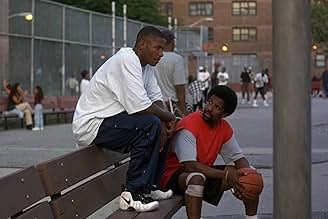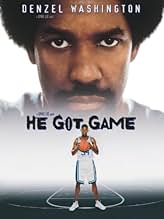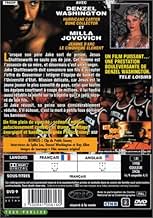He Got Game
- 1998
- Tous publics
- 2h 16m
A basketball player's father must try to convince him to go to a college so he can get a shorter sentence.A basketball player's father must try to convince him to go to a college so he can get a shorter sentence.A basketball player's father must try to convince him to go to a college so he can get a shorter sentence.
- Awards
- 10 nominations total
- Director
- Writer
- All cast & crew
- Production, box office & more at IMDbPro
Featured reviews
He got game is an exceptional story about a basketball player who quarrels with family issues and strives towards his dream. Directed by Spike Lee, this movie takes an in depth look at exactly how many variables are involved when being the MVP, and how a man can grow up and assess these circumstances.
Ray Allen plays a character who's name is Jesus Shuttlesworth. At a young age, his father pressed him dramatically to be the best he could be. However by mistake kills Jesus's mother and is sent to prison. The troubled child eventually grows up to become one for the best players in the nation. Now the drama builds up. When the decision to go pro or join a college team is just around the corner, Jesus's father (played by Denzel Washington) is let out of jail to convert his son to a specific school or else the father is returned to jail, it leaves Jesus with a daunting task. The reconcile between the father and son is what eventually allows Jesus to become a real man and face his problems.
The idea that a boy cannot live without his father plays a defined role in this movie. Jesus grows up with the responsibilities of taking care of his sister, who is several years younger than he is. While it appears that Jesus has all of the support in the world, Spike Lee does a terrific job of accentuating how they are really leeches. All the people want are money, fame, and fortune; which is all possible through Jesus. The reason the father plays such a key role is because although he needs Jesus's help, he isn't interested in that. He really loves his son.
Although Spike Lee did some amazing work with this movie especially with the inner city sequences, as well as the use of colors and poetry to his advantage for getting his ideas across to the audience, several scenes were unneeded which seemed overly explicit. Although these are truly issues that can ruin a famous person, they seemed almost too graphic to be seen by a general audience. What Spike does so well is keeping the real connections with the street, and enabling the audience to see exactly what the character is going through by using several techniques.
Colors in the movie such as red, green, and black symbolize power, pain, and respect between different characters. While Jesus hates his name, his father named him that through a basketball player that was how he put it, "the truth." This movie proves that in real life, you can benefit more by forgiving, and not forgetting.
Overall I would recommend this film to anyone who wants to see a unique, intellectual film that will make you think about your present situation, as well as allowing you to know the difficulties that come with fame.
Ray Allen plays a character who's name is Jesus Shuttlesworth. At a young age, his father pressed him dramatically to be the best he could be. However by mistake kills Jesus's mother and is sent to prison. The troubled child eventually grows up to become one for the best players in the nation. Now the drama builds up. When the decision to go pro or join a college team is just around the corner, Jesus's father (played by Denzel Washington) is let out of jail to convert his son to a specific school or else the father is returned to jail, it leaves Jesus with a daunting task. The reconcile between the father and son is what eventually allows Jesus to become a real man and face his problems.
The idea that a boy cannot live without his father plays a defined role in this movie. Jesus grows up with the responsibilities of taking care of his sister, who is several years younger than he is. While it appears that Jesus has all of the support in the world, Spike Lee does a terrific job of accentuating how they are really leeches. All the people want are money, fame, and fortune; which is all possible through Jesus. The reason the father plays such a key role is because although he needs Jesus's help, he isn't interested in that. He really loves his son.
Although Spike Lee did some amazing work with this movie especially with the inner city sequences, as well as the use of colors and poetry to his advantage for getting his ideas across to the audience, several scenes were unneeded which seemed overly explicit. Although these are truly issues that can ruin a famous person, they seemed almost too graphic to be seen by a general audience. What Spike does so well is keeping the real connections with the street, and enabling the audience to see exactly what the character is going through by using several techniques.
Colors in the movie such as red, green, and black symbolize power, pain, and respect between different characters. While Jesus hates his name, his father named him that through a basketball player that was how he put it, "the truth." This movie proves that in real life, you can benefit more by forgiving, and not forgetting.
Overall I would recommend this film to anyone who wants to see a unique, intellectual film that will make you think about your present situation, as well as allowing you to know the difficulties that come with fame.
It finally happened, and the movie we all thought Spike Lee would make became reality. With Lee's own little foray into the basketball world, I always wondered when he would create a story which reflected his unique views of the game. While sometimes over sensationalized, he depicted a seedy world comprised of two-faced individuals all the way down to the seedy high school coach to the professional agent. I also felt it depicted some very frank images of the cultural aspects of athletics, the sex, the money and the little freebies. While the film didn't need the story between Denzel Washington and Milla Jovovich, it was strong in most aspects. It was a bit of a change of pace for Spike Lee, considering the graininess of the film stock and the rather mundane colors. Also, Ray Allen had one of the best pro athletes-turned-actor performances in a long time.
Director Spike Lee's ode to basketball is one of those frustrating experiences that appears to be a possible slam dunk, but ultimately ends up fouling out mainly because of an uneven story and a nearly invisible tone. Denzel Washington is serving a prison sentence for killing his wife in a domestic dispute. While away, his son has grown to become high school basketball stand-out Ray Allen (a real-life NBA player). Governor Ned Beatty promises to shorten Washington's sentence if he can convince Allen to attend Beatty's alma mater. He has one week to accomplish his goal. Naturally Allen is outraged by seeing his father again and creates a shell to keep Washington out of his life. At first this seems like a good thing, but what if all of Allen's so-called friends (coaches, relatives, girls, agents and fans) are the true antagonists here and Washington is the flawed hero? Lee is never sure what he wants to do here. The movie plays out like a chaotic basketball game with lots of action and memorable action, but in the end you do not want either team to win. Washington and Allen's relationship takes up some airtime, but so do others that leave almost as fast as they appear. The corruption in collegiate athletics and within sports agencies is also given an interesting glimpse, but alas those topics are not explored completely. "He Got Game" looked like it would match the brilliance of William Friedkin's "Blue Chips" (a flawed, but important movie), but just does not seem to have the coaching necessary. Washington is impressive and handles the material as well as he can. Allen is a complete revelation. Anfernee Hardaway had stolen the show from Nick Nolte in "Blue Chips" and Allen pretty much does the same thing in this one. Ray Allen seems to have unlimited potential in front of the camera and his gift could be developed more fully after his playing career ends. I have said for years that Ray Allen should be the best player in the NBA, but he has ultimately disappointed me throughout his professional career. Allen is not the problem here though. Lee's sporadic direction and a meandering script end up sending "He Got Game" to the locker room way too soon. 2.5 out of 5 stars.
Spike Lee's He Got Game is a beautifully shot and well-executed exploration of the role that the sport of basketball plays in the relationship between a father and his estranged son. At the outset, having not seen very many other Spike Lee movies, I didn't really know what to expect or what to compare this film to. However, I was pleasantly surprised at the overall quality of the plot and the cinematography that composed this film. Furthermore, I really liked the definitive sense of Spike's style that was quite apparent throughout.
Told through flashbacks that reveal the plot throughout the course of the movie, He Got Game is about Jake Shuttlesworth (Denzel Washington) and his basketball-star son, Jesus (Ray Allen). Jake is in jail under mysterious circumstances, yet can get out of jail if he is able to convince Jesus to choose to play basketball at a specific school, namely the state governor's alma mater. Released for a week in order to complete the daunting task, he hounded by probation officers, and does a lot of things that he couldn't do in jail, such as have a light dalliance with Milla Jovovich's slightly-unnecessary prostitute character, Dakota Burns. Denzel, as usual, excellently handles his role as the intense father, and is utterly believable in both his emotion-laden and his violent, angry scenes.
Ray Allen's portrayal of Jesus is also an interesting and well-played usage of the strong dichotomy of masculinity in the sport of basketball. He very clearly shows the purer and more tender side of his character through his love for his younger sister, whom he lives with and takes care of. Yet he is torn between that and the glittering, vice-infested world that his ability at basketball brings him ever closer to. At times he does even succumb to the cloying ploys of others, and there is a particularly raunchy scene as evidence of this. Allen carefully and quietly allows the audience to see the conflicts between sensitivity and machoism that exist in his life, as a result of basketball.
Probably one of the more interesting ways in which this film is set up is through the use of comparative shots that allow the similarities of Jake and Jesus's actions to show. Jesus tries so hard to distance himself from his father, yet the shots and the camera framing show just how alike they both really are. I also particularly enjoyed the use of color and contrasts that appeared throughout. For instance when Jesus and his errant girlfriend LaLa (Rosario Dawson) are talking at the end of the film, both their faces vividly reflect a shade of jealous green from the amusement park lights.
Overall this film is a very good spin on the basketball sports movie, yet with no huge stadiums or big games to win the championship, like what usually constitutes a basketball movie. Instead, the two main characters go through much self-analysis and introspective maturing, something that is quite rare for sports-playing men in film to do. I liked the strong use of color and the well-framed shots, and especially enjoyed Denzel Washington's brooding performance. A classic, must-see movie for anyone interested in cinematography or film.
Told through flashbacks that reveal the plot throughout the course of the movie, He Got Game is about Jake Shuttlesworth (Denzel Washington) and his basketball-star son, Jesus (Ray Allen). Jake is in jail under mysterious circumstances, yet can get out of jail if he is able to convince Jesus to choose to play basketball at a specific school, namely the state governor's alma mater. Released for a week in order to complete the daunting task, he hounded by probation officers, and does a lot of things that he couldn't do in jail, such as have a light dalliance with Milla Jovovich's slightly-unnecessary prostitute character, Dakota Burns. Denzel, as usual, excellently handles his role as the intense father, and is utterly believable in both his emotion-laden and his violent, angry scenes.
Ray Allen's portrayal of Jesus is also an interesting and well-played usage of the strong dichotomy of masculinity in the sport of basketball. He very clearly shows the purer and more tender side of his character through his love for his younger sister, whom he lives with and takes care of. Yet he is torn between that and the glittering, vice-infested world that his ability at basketball brings him ever closer to. At times he does even succumb to the cloying ploys of others, and there is a particularly raunchy scene as evidence of this. Allen carefully and quietly allows the audience to see the conflicts between sensitivity and machoism that exist in his life, as a result of basketball.
Probably one of the more interesting ways in which this film is set up is through the use of comparative shots that allow the similarities of Jake and Jesus's actions to show. Jesus tries so hard to distance himself from his father, yet the shots and the camera framing show just how alike they both really are. I also particularly enjoyed the use of color and contrasts that appeared throughout. For instance when Jesus and his errant girlfriend LaLa (Rosario Dawson) are talking at the end of the film, both their faces vividly reflect a shade of jealous green from the amusement park lights.
Overall this film is a very good spin on the basketball sports movie, yet with no huge stadiums or big games to win the championship, like what usually constitutes a basketball movie. Instead, the two main characters go through much self-analysis and introspective maturing, something that is quite rare for sports-playing men in film to do. I liked the strong use of color and the well-framed shots, and especially enjoyed Denzel Washington's brooding performance. A classic, must-see movie for anyone interested in cinematography or film.
10thekino
I recently watched this movie for the first time, and as a 19 year old black male it spoke to me. However, I can see this being a film that everyone can appreciate. Especially now, with Lebron James and other upcoming HS athletes, you really see the other side of life that only they know.
This movie detailed the life of the #1 basketball star in HS, and the issues he deals with before he announces his plans for the future, further complicated by his father's contingent release from jail.
A GREAT movie, don't let the votes fool you, it's not a 6.5/10, more like 8.5.
This movie detailed the life of the #1 basketball star in HS, and the issues he deals with before he announces his plans for the future, further complicated by his father's contingent release from jail.
A GREAT movie, don't let the votes fool you, it's not a 6.5/10, more like 8.5.
Did you know
- TriviaSpike Lee originally wanted Kobe Bryant to play the part of Jesus Shuttlesworth. While Bryant liked the script, and the idea of working with Lee, he had just finished his rookie year in the NBA (the 1996-97 season), and had shot several air balls in a brutal playoff loss by the Lakers to the Utah Jazz. For this reason, Bryant planned a workout program that would help him maintain his strength through the longer NBA seasons (a major adjustment, as Kobe went straight from high school to the pros). After Bryant consequently turned the movie role down, noting that the summer of 1997 was too important to spend time making the film, Lee promptly sought out Ray Allen, who quickly accepted the lead role.
- Quotes
Jesus Shuttlesworth: Basketball is like poetry in motion, cross the guy to the left, take him back to the right, he's fallin' back, then just J right in his face. Then you look at him and say, "What?"
- SoundtracksJohn Henry
Performed by London Symphony Orchestra
Aaron Copland, Conductor
Written by Aaron Copland
The Aaron Copland Fund for Music, Inc., Copyright Owner
Boosey & Hawkes, Inc., Solo Publisher
Courtesy of Sony Classical
Details
- Release date
- Country of origin
- Language
- Also known as
- No perdonarás
- Filming locations
- Production companies
- See more company credits at IMDbPro
Box office
- Budget
- $25,000,000 (estimated)
- Gross US & Canada
- $21,567,853
- Opening weekend US & Canada
- $7,610,663
- May 3, 1998
- Gross worldwide
- $21,567,853
- Runtime2 hours 16 minutes
- Color
- Sound mix
- Aspect ratio
- 1.85 : 1
Contribute to this page
Suggest an edit or add missing content








































